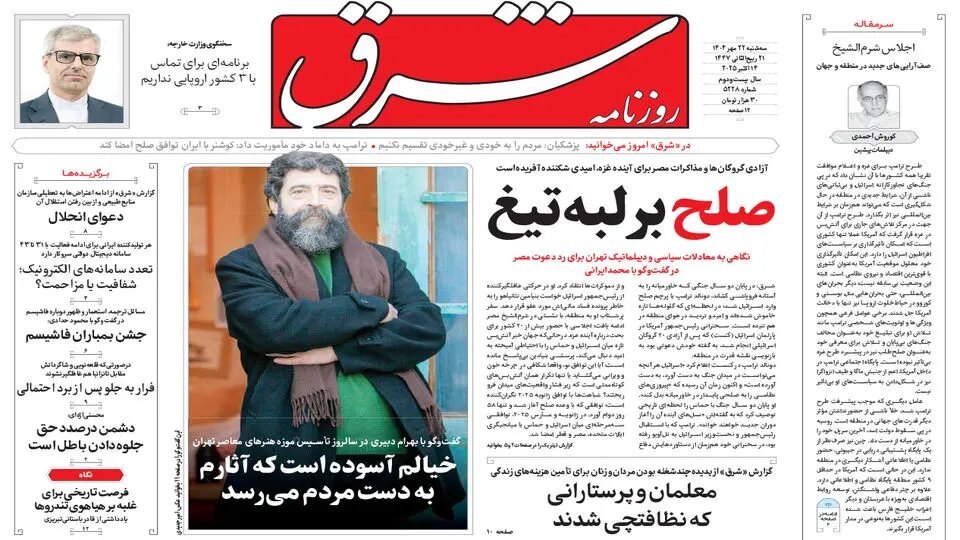Troika’s diplomatic isolation in the nuclear issue

TEHRAN - In a note, Shargh said the European troika of Britain, France and Germany have been sidelined in regard to the Iran nuclear issue because they have turned from mediator into “pressure partner” by invoking the snapback mechanism that returned UN Security Council sanctions against Iran.
It wrote: In their statement, the three countries described the activation of the snapback as a “correct and necessary step.” The European troika’s action in activating the snapback mechanism has effectively moved the three countries from the position of “mediator” to the position of “pressure partner” against Iran. The return of sanctions means that, in Tehran’s view, Europe no longer has any new tools or levers for influence, and there is no incentive for Iran to talk. Therefore, it is not expected that even if new talks begin, Iran will be inclined to put Europe at the top of the negotiations. It seems that Tehran is redefining the path of its interactions based on cooperation with non-Western powers such as Russia, China, and some countries in the region; actors that, at least from Tehran’s perspective, follow an approach based on mutual interests instead of a policy of threats and sanctions.
Etemad: FATF and rebuilding trust in global financial system
Etemad wrote about the disadvantages of being on the FATF blacklist and the advantages of joining it. The newspaper argues that Iran’s political and economic relations have been deeply intertwined with the world in recent decades. After the intensification of sanctions, Iran’s economy suffered from two major points: first, the country’s trade exchanges faced extensive restrictions. Second, the banking and financial sector was practically excluded from the international banking network as Iran was put on the FATF blacklist. In such circumstances, joining FATF could be a positive step from an economic perspective. However, it is not expected that an implementation of the FATF can alone solve economic problems unless simultaneously new ways for financial interaction with the world are opened. If Iran can activate its banking relations through indirect but legitimate means, then the implementation of the FATF could be a positive sign for rebuilding trust in the global financial system. Even today, although this measure is on the right track, its effectiveness depends on the political conditions and the government's will to rebuild international relations.
Vatan-e-Emrooz: Iran won’t surrender
Vatan-e-Emrooz examined the U.S. strategic policy towards Iran and wrote: The U.S. government has now placed Iran at a crossroads with its policies: surrender or resistance. Through its behavior, whether in the form of nuclear negotiations with the U.S. or negotiations related to the snapback mechanism, Iran proved that it is ready for a win-win agreement with the Western parties. The JCPOA proved that contrary to the U.S. and Zionist regime's propaganda campaigns, Iran had never sought to militarize nuclear knowledge. The Islamic Republic did not back down from its red lines in any of these negotiations and showed that, despite the U.S. miscalculations, Tehran is unyielding in its positions, especially defending the nation's nuclear rights. Iran has fully observed security concerns in regard to its 60 percent uranium reserves. In any case, the Islamic Republic has shown that it is not ready to surrender, both in its declared positions and in its policies.
Iran: Middle East after the end of the Gaza war
In an interview with foreign policy expert Mostafa Najafi, the Iran newspaper discussed the Middle East after the end of the Gaza War. Najafi says: After the ceasefire, we are witnessing an increase in the role of the United States in the political and security arrangements in the region. Therefore, Iran will be the most important issue for the United States in the Middle East. Iran will remain a major challenge to American and Israeli interests in the region, and plans such as normalizing Arab-Israeli relations or security alliances with NATO support could conflict with Tehran's security interests in the long term. Therefore, Iran should follow the path of smart balancing by using the capacities of regional diplomacy, relying on hard and soft deterrence to prevent security pressures, and transforming its geographical location into a lever for economic and transit development. In general, the Middle East after Gaza is not necessarily on the verge of establishing a new order; rather, it is going through a phase of redefining roles. For Iran, the main challenge is to choose between joining the order of others or shaping a desirable order in partnership with others. In particular, the future of the region will be determined not by winning wars but by the ability of countries to manage the transition of order.
Leave a Comment